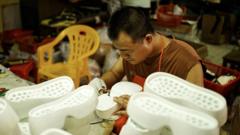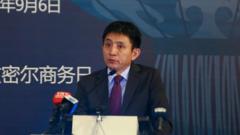In a striking response to President Trump's threats of heightened tariffs, China asserts its determination to resist U.S. pressure and protect its economic interests.
China Ready to Stand Firm Against U.S. Tariff Threats

China Ready to Stand Firm Against U.S. Tariff Threats
Beijing labels President Trump's proposed tariff increases as economic blackmail amid escalating trade tensions.
In a heated exchange over trade relations, China retaliated against U.S. President Donald Trump’s recent threats to impose an additional 50 percent tariff on Chinese goods, alleging such actions to be economic blackmail. On April 7, 2025, China’s Ministry of Commerce condemned Trump’s ultimatum, which could significantly escalate the ongoing trade disputes between the two nations.
The ministry refrained from naming Trump directly but described the proposed tariffs as a “mistake on top of a mistake” that showcases the coercive tactics employed by the United States. It emphasized that China would "fight to the end" to safeguard its economic interests and would respond with countermeasures. In a decisive move last week, China had already enacted a retaliatory 34 percent tax on American imports, underscoring its fierce commitment to challenging U.S. trade policies.
Should Trump's threats come to fruition, overall tariffs on Chinese goods could exceed 104 percent for certain products, compounding the already hefty levies that originated in his previous term. The implications for American consumers—and importers across various sectors such as clothing and electronics—could be substantial, considering U.S. purchases from China amounted to $440 billion last year, making it the second-largest trade partner for imports after Mexico.
Amid these tensions, China urged the U.S. to cancel unilateral tariffs and emphasized the importance of resolving disputes through respectful dialogue. Significantly, Beijing has been seeking high-level discussions with the Trump administration, hoping to pave the way for a potential summit between Trump and Chinese President Xi Jinping. Nonetheless, efforts to initiate talks have met with limited responses from the White House, leaving the prospects for constructive engagement uncertain.
Berry Wang contributed to this article, reporting on the intricacies of U.S.-China relations. David Pierson specializes in covering Chinese foreign policy and economic strategies and has over twenty years of journalistic experience.
The ministry refrained from naming Trump directly but described the proposed tariffs as a “mistake on top of a mistake” that showcases the coercive tactics employed by the United States. It emphasized that China would "fight to the end" to safeguard its economic interests and would respond with countermeasures. In a decisive move last week, China had already enacted a retaliatory 34 percent tax on American imports, underscoring its fierce commitment to challenging U.S. trade policies.
Should Trump's threats come to fruition, overall tariffs on Chinese goods could exceed 104 percent for certain products, compounding the already hefty levies that originated in his previous term. The implications for American consumers—and importers across various sectors such as clothing and electronics—could be substantial, considering U.S. purchases from China amounted to $440 billion last year, making it the second-largest trade partner for imports after Mexico.
Amid these tensions, China urged the U.S. to cancel unilateral tariffs and emphasized the importance of resolving disputes through respectful dialogue. Significantly, Beijing has been seeking high-level discussions with the Trump administration, hoping to pave the way for a potential summit between Trump and Chinese President Xi Jinping. Nonetheless, efforts to initiate talks have met with limited responses from the White House, leaving the prospects for constructive engagement uncertain.
Berry Wang contributed to this article, reporting on the intricacies of U.S.-China relations. David Pierson specializes in covering Chinese foreign policy and economic strategies and has over twenty years of journalistic experience.






















